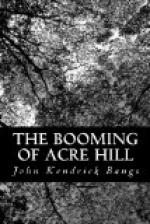II.
“YONKERS, N. Y.
“Our Uncle Willie in New York sends us Nursery Days every week. We like it immensely, and every one tries to get the first reading of it. “Tommy and the Huckleberry-tree” is a splendid story. Papa bought six copies of Nursery Days with that in it to send to my little cousins in England.
“JIMMIE CONWAY RHODES.”
Others were more laudatory of Partington’s story, some less so, but each demanded more of his work.
These written, Partington made arrangements to have them posted from the various towns wherein they were ostensibly written, and then, when they had been posted, he chuckled slightly and sat down to await developments.
It took a trifle over one week for developments to develop, and then they developed rapidly. Just eight days after his conception of this magnificent scheme the postman whistled at Partington’s door and left this note:
“OFFICE OF NURSERY DAYS,
“NEW YORK, March 16, 1889.
“Richard Partington Smithers, Esq.:
“DEAR SIR,—Can you call upon me some afternoon this week? Yours truly,
“THOMAS JACKSON TORPYHUE,
“Editor Nursery Days.”
“The bait is good, and I’ll land the fish at once,” said Partington, his face wreathing with smiles. “I’ll call upon Mr. Thomas Jackson Torpyhue.”
And call he did. Two hours later he entered the sanctum of the editor of Nursery Days.
“Good-afternoon,” he said, as he sat down at the editor’s side.
“Good-afternoon, Mr. Smithers,” said Mr. Torpyhue. “I’m very glad to see you.”
“I thought you’d be,” began Partington, forgetting himself for a moment in his triumph. “If that wasn’t evidence enough that I—ah—oh—er—ah! Ahem! Why, certainly,” he continued, suddenly recalling the fact that as yet he could properly have no knowledge of the evidence in question.
The editor threw his head back and laughed, and Partington forced himself to join him, nervously withal.
“You have heard of the evidence have you?” asked Mr. Torpyhue.
Partington gasped faintly, and said he thought not.
“Well, it’s very strange, Mr. Smithers,” said Mr. Torpyhue, “but do you know that you have developed into one of our most popular authors?”
“Indeed?” queried Partington, pulling himself together and trying to appear gratified.
“Yes, sir. Here is a bundle of twenty-four letters all received within three days. One of the letters calls you the best writer of short stories of the day. Another, from Canada, written by a parent, says that you have written one of the most delightful bits of juvenile humor that he has seen in forty years.”
“How extremely flattering!” said Partington, faintly.
“Yes, extremely,” assented the editor, dryly. “And now, Mr. Smithers, I’m going to do for you what this paper has never done even to its most popular author in the past.”




